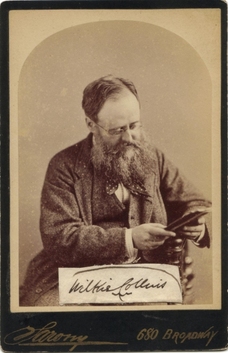
I spoke too soon when agreeing that The Fallen Leaves was Wilkie Collins’ worst novel – Blind Love (1890) is an absolute stinker. To be fair to Collins, he died while writing the novel and therefore had no opportunity to revise it. On his deathbed, Collins asked that his friend Walter Besant finish the novel, providing him with detailed notes and a plot outline. Without the benefit of the preface, it would be quite hard to detect where Collins ends and Besant begins, although the latter’s misogyny and elitism does creep in on occasion.
The novel tells the story of Iris Henley and her “blind love” for the reckless Lord Harry Norland, who gets himself involved in Fenian terrorism and is implicated in acts of violence. Despite his very obvious shortcomings, Iris remains romantically loyal to him, refusing to marry dependable Hugh Mountjoy, the suitor favoured by her father. Although Iris’ devotion to Lord Harry is undermined by a number of revelations, she accepts his marriage proposal after he slashes his own throat and is saved by the sinister Dr Vimpany.
Lord Harry initially settles down to a quiet married life with Iris, but the parlous state of his finances prompts him to embark upon another hair-brained scheme. He fakes his own death by allowing Dr Vimpany to murder a patient and photograph him wearing Lord Harry’s clothing. Iris is unwittingly drawn into the conspiracy to falsely claim £15,000 of insurance money. When she gets wind of what’s going on, however, Iris immediately renounces her husband, refusing to have anything more to do with him. A broken man, Lord Harry effectively commits suicide by walking straight into the path of vengeful terrorists. Iris subsequently agrees to a rather more conventional marriage with Hugh Mountjoy, although retaining a lock of her first husband’s hair to remind her of “the blind love that had so cruelly misled her!”
Collins’ engagement with the highly topical issues of Irish Home Rule and Fenianism make Blind Love potentially very interesting. It’s a shame he didn’t find a better vehicle for the idea, or at least get the chance to revise and tighten up the manuscript. The other sensational elements – suicide, insurance fraud, murder, and evil doctors – also show great promise, but get lost in a labyrinthine and overwrought plot, which has the feel of a morphine-induced dream (and was quite possibly inspired by one).
I feel slightly guilty for being so dismissive about Wilkie Collins’ final novel, especially when it was published under such melancholy circumstances. However, it is the brilliance of his other work that makes Blind Love such a disappointment, and it’s a pity that it was to be his last gift to lovers of sensation fiction.
Blind Love by Wilkie Collins